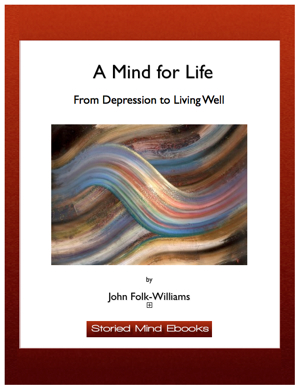I’m happy to announce that A Mind for Life, my ebook on recovery from depression, is now available. Unlike many recent books about how to deal with the illness, this one focuses on the inner work of change rather than medical treatments and experience with antidepressants. It may not be for everyone, but it captures the struggle I’ve had to face in overcoming internal resistance to change and in mastering the skills of mind and living that have helped me get my life back from depression.
Writing this ebook became a major challenge for me because I kept having to test the truth of all my ideas and beliefs about my own recovery. Every day when I felt down made me ask myself if I really had learned to live well again. There were lots of long pauses in the writing as I kept checking to see if the approach I described was still working. Some of this was a shadow of old shame or one of the other depressive tendencies that used to consume me. But a lot of the difficulty is inherent in the whole subject of a pervasive condition like depression and the effort to get back to the basics of who you are as a person.
There is no finishing this project, no one moment of recognition, no coming to a conclusion. The story is ongoing, and I hope I have captured a sense of the many riches you can find along the way.
Here is an excerpt from the introduction with an overview of the major sections of the book.
-
The Mindset for Recovery. Change can only begin when you recognize that you have an illness called depression. Even after the initial breakthrough of recognizing the problem, there are many inner obstacles to overcome before you can get into the work of recovery. This section explores the inner barriers that gave me the most trouble and the kind of mindset or basic attitude toward getting well that helped sustain me through a difficult process.
-
Mapping Your Depression. It’s one thing to get the idea that you have an illness called depression but another to become intimately familiar with the specific ways it is changing your life. Tracking its widespread influences in how you think, handle emotions, respond to people, and carry on the basic functions of living is a good way to go beyond what the doctors and books tell you about symptoms and understand in depth how depression is taking away the things you most value.
-
Self-Help for the Healing Mind. Depending on how depression affects you, there are many skills you need to learn to help you respond. In this section, I discuss five forms of self-work that made a big difference in my ability to manage the illness: changing habits of negative thinking; opening up to others through writing; informal meditation; the cultivation of mindfulness; and developing a felt sense of bodily awareness through the method of focusing.
-
The Guidance of Psychotherapy. The guided experience of psychotherapy has been part of my response to depression for decades, but it’s only in recent years that I have been able to integrate its value into healing in a sustaining way. That’s because I learned more clearly how and why it can work effectively and why it often doesn’t. In this part I discuss the lessons that have helped me the most.
-
Finding your Life Again. After years of responding to depression as a set of symptoms characterizing an illness, I turned my attention to the positive side of living. What did it mean to be really well, and what kind of life could I build after losing so much to depression? I needed to apply all that I had learned through therapy, writing and mindfulness to living the life I really wanted.
-
A Step Beyond Recovery. In this section, I explore ways in which it’s possible to experience even a relapse into depression while staying in touch with the core of vitality.
-
Learning More. Continual learning about depression and well-being is another important tool I use, and in this section I pull together some of the best resources I know for further exploration.
I’ve set the price for A Mind for Life at $2.99 US through the end of March. I hope you’ll download a copy and let me know what you think.



I think it is a good idea to focus on inner change rathe rthan the medical element as inner changes gives us back control which is something you don’t always feel you have when dumped with pills.
This is a great overview for those suffering from depression to understand that coping with depression through medication only is a way to treat and mask the core issues that need to be brought into awareness. In therapy with my clients, I also use tracking of symptoms, journaling and helping them to uncover the irrational mind set of what they are telling themselves while in depression. By helping them to normalize and see that they have the inner strength and ability to pull themselves out of a depressive episode, they soon see the response time of their depressive episodes shorten. It’s vital to incorporate several techniques and methods to cope and deal with depression so that it does not run your life and create the belief that you can never recover from depression. Seeking depression therapy (www.hitations.com) in both an individual and group setting can help tremendously to regain your life back and dig deep to find that your much stronger than you think.
John, CONGRATS! So many years in observation, experience, study, reflection, and conversation surely have come together here 🙂 Looking forward to reading 🙂
Jaliya
The more you work on the inside yourself, the better of you’ll be. Sounds like your book will awaken people to this fact. Everything starts from within yourself. Other’s can’t help you until you start helping yourself.
Hi, it seems there has not been anyone making review and show the result of it. Please let us know the result, I’m very exited to hear from everyone.
Well done on the book – it will help a lot of people..
Thank you, Jack –
I hope you’re right and that it will help.
John
I have eagerly looked forward to your next post and am so glad it is about your new ebook. Also, I can totally relate to your comment about checking to see if your ideas and beliefs about recovery continue to ring true. So often I have posted about my own journey and what recovery is and isn’t, then days later I realize my perspective has changed once again. It is hard to trust that what I write to day will be just as true tomorrow. It’s like there is no absolute truth regarding experience — it shifts, it expands, it disappears, and it gets rewritten. I’m glad you could get it all to “gel” into something you feel comfortable putting out there for the rest of us.
Hi, Donna –
I know you’ve been through a similar process. Perhaps you’ll write more about yours too. Here’s hoping.
John
Congratulations John!
I have just downloaded a copy of your new book and will give you some feedback when I am done.